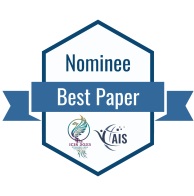Advances in Methods, Theories, and Philosophy
Loading...
Paper Number
1509
Paper Type
Completed
Description
In recent years, computationally intensive theory construction, leveraging big data and machine learning (ML), has gained significant interest in the information systems (IS) community. The integration of computational methods can generate novel methodological paradigms or enhance existing methods. Agent-based modeling (ABM) is one of the computational methods that has recently proliferated in IS research to generate computationally intensive theories. However, ABM is still in nascent state of adoption in IS research and entails some pathological challenges that limit its applicability and robustness. With the goal of advancing ABM in IS research, this article proposes a methodological framework that integrates ML within relevant steps of ABM. The framework is demonstrated in an exemplary IS study, showing its potential for addressing the pathological challenges of ABM. We finally discuss the implications of applying the proposed methodological framework in IS research.
Recommended Citation
Bashardoust, Amirsiavosh; Safaei, Negin; Haki, Kazem; and Shrestha, Yash Raj, "Employing Machine Learning to Advance Agent-based Modeling in Information Systems Research" (2023). ICIS 2023 Proceedings. 3.
https://aisel.aisnet.org/icis2023/adv_theory/adv_theory/3
Employing Machine Learning to Advance Agent-based Modeling in Information Systems Research
In recent years, computationally intensive theory construction, leveraging big data and machine learning (ML), has gained significant interest in the information systems (IS) community. The integration of computational methods can generate novel methodological paradigms or enhance existing methods. Agent-based modeling (ABM) is one of the computational methods that has recently proliferated in IS research to generate computationally intensive theories. However, ABM is still in nascent state of adoption in IS research and entails some pathological challenges that limit its applicability and robustness. With the goal of advancing ABM in IS research, this article proposes a methodological framework that integrates ML within relevant steps of ABM. The framework is demonstrated in an exemplary IS study, showing its potential for addressing the pathological challenges of ABM. We finally discuss the implications of applying the proposed methodological framework in IS research.
When commenting on articles, please be friendly, welcoming, respectful and abide by the AIS eLibrary Discussion Thread Code of Conduct posted here.




Comments
20-Theory